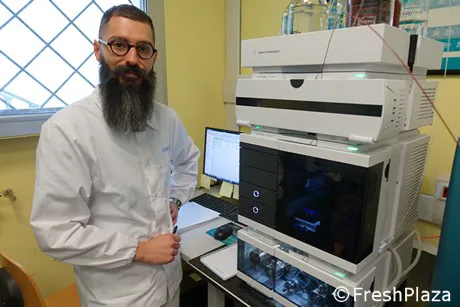The analyses concerning the detection of chlorate and perchlorate residues in fruit and vegetables have proved even more necessary, as legal limitations will be mandatory at a European level with effect from 28 June 2020 for chlorates, and from 1 July 2020 for perchlorates. Currently there are two revised regulations that set legal limits to be complied with, the Reg. 2020/749 on residues for Chlorates, and the Reg. 2020/685 on contaminants for Perchlorates.
 Maverik Bezzi
Maverik Bezzi
"In some countries, there are supermarket chains," explained Maverik Bezzi of the Sicural laboratory, "that pay close attention to this issue. In Germany, the monitoring tests for the contaminant perchlorate showed, during 2017 and 2018, positivity of 24% on a total of 5118 samples analyzed, with positivity exceeding 80% of the samples screened for matrices such as spinach, cabbage and rocket. Also in Germany, in 2018, chlorates were positive on 33% of about 900 samples tested, a slight increase compared to 2017, when the percentage was 29%."
The enactment of the two regulations has made the monitoring of these residues essential for companies operating in the food sector. The Sicural laboratory has been accredited in this field for many years now, and conducts the analysis in high-performance liquid chromatography coupled with mass spectrometry (LC-MS/MS) with a limit of quantification of 0.01 mg/Kg.
"The presence of analytes in food products - added Bezzi - may originate, according to some scientific studies, from three main sources of contamination, such as by-products for chemical disinfection of water, mainly used in the processing and washing of fruit and vegetables, fertilizers of foreign origin (Perchlorates), and Perchlorate naturally formed in the atmosphere. A further source of contamination could come from the multiple sanitizing products used in the Covid period, in cross-contamination during sampling, before the product is delivered to the laboratory."
It should also be mentioned that Sicural has developed a molecular biology test (see FreshPlaza of 05/22/2020) to detect the presence of SARS-CoV-2 (causal agent of Covid-19) in environmental buffers. These tests are important to detect the presence of the virus on work surfaces in order to perform environmental monitoring and to evaluate the effectiveness of the sanitization processes adopted according to the guidelines. Companies in the food industry can carry out these tests at regular intervals, thus providing additional security for their customers.
Contact:
Sicural
Via Dismano 2855,
47522 Cesena (FC)
Phone.: (+39) 0547 377303
Email: laboratorio@sicural.it
Website: www.sicural.it

